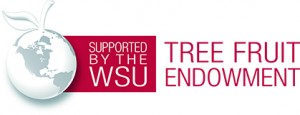Overview
Integrated Pest Management
Integrated pest management (IPM) involves using several control strategies based on knowledge of a crop, its pests and their associated natural enemies to avoid crop loss and minimize harmful effects on the environment.
Seasonal insect and disease control requires adequate monitoring, properly timed control and appropriate choice of cultural, insecticidal and biological controls.
Proper monitoring requires an understanding of pest/disease biology and protocols for trapping. Insect information is included in the online Orchard Pest Management book and the Pest Management Transition Handbook also has information for monitoring key insect pests.
Thanks to WSU research, IPM continues to evolve. In a global marketplace, it is inevitable that new pests will invade. But as they do, scientists continue to find new control techniques. And that’s a good thing for the Washington tree fruit industry, because consumers’ concerns over insecticide residues on food, contamination of the environment, and exposure of farm workers to insecticide residues during thinning, tree training, and harvesting operations are issues of increasing importance. IPM addresses each of these concerns. Learn more »
Organophosphate Transition Program
In part driven by the challenges posed by the impending loss of azinphosmethyl (AZM) and international regulations regarding minimum residue limits (MRL’s) on fruit, WSU’s pesticide transition program is tasked with changing practices, attitudes and perceptions of apple IPM activities while sustaining grower profitability through acceptable crop protection, reducing pesticide exposure risks to farm labor, and enhancing environmental quality. Learn more »
Orchard Pests
WSU Entomologists strive to develop better pest management practices through advancements in the understanding of insect biology, behavior, and the interactions between orchard ecosystems and the inputs that are necessary to produce quality tree fruit crops. Learn more »
Decision Aid System
The Decision Aid System (DAS) uses models based on insect biology coupled with weather data to predict when insects could be present.
The WSU DAS and the Crop Protection Guide for Tree Fruits offer the latest options in control for commercial orchards.
